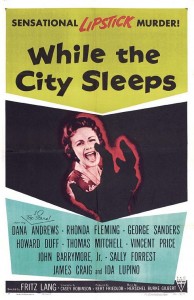Brute Force (1947)
“Those gates only open three times: when you come in, when you’ve served your time, or when you’re dead.”
“Those gates only open three times: when you come in, when you’ve served your time, or when you’re dead.”
“We are witnessing an operation that may bring to life a man who — for all normal intents and purposes — has been dead for thirty years.”
|
Synopsis: |
|
Genres, Themes, Actors, and Directors:
Review: Redeeming Qualities and Moments:
Must See? Links: |
“I took this form because if I showed myself to you as I am, you wouldn’t be able to comprehend me.”
|
Synopsis: |
|
Genres, Themes, Actors, and Directors:
Review: Redeeming Qualities and Moments:
Must See? Links: |
“I must know everything. I must penetrate the heart of his secret. I must become Caligari!”
|
Synopsis: |
|
Genres, Themes, Actors, and Directors:
Response to Peary’s Review: Apart from its truly unique sets, what’s most distinctive about Caligari is its twisted narrative structure, in which our comprehension of what we’re seeing is continually shaken; a quick glance at the genres listed above indicates that this short film goes in many different directions throughout its scant hour-plus running time. There’s essentially a story within a story within a story here; to that end, Caligari is a film which nearly demands multiple viewings in order to “get” what exactly is happening. Indeed, Peary notes that Caligari was likely “the first ‘cult’ movie”, given that it played “in one French theater for seven consecutive years” — for this reason alone, no film fanatic can afford to miss it. Redeeming Qualities and Moments:
Must See? Categories
(Listed in 1001 Movies You Must See Before You Die) Links: |
[Note: The following review is of a non-Peary title; click here to read more.]
“I was just wondering what I’d done to deserve you.”
|
Synopsis: |
|
Genres, Themes, Actors, and Directors:
Review: The infamous sequence during which Myra (Crawford) accidentally overhears Palance and Grahame’s plans to murder her is particularly wrenching; Myra’s not only afraid for her life, but heartbroken and stunned to learn that her beloved husband is nothing close to what he appears. It’s a hell of a thing to learn in one fell swoop that your husband is not just deceitful but a homicidal psychopath as well. Once this “plot twist” occurs, the remainder of the film plays out with remarkable tension and suspense: while we know that Myra’s concocted a plan, and that it will likely be a good one (Myra is, after all, a renowned playwright), we have no idea exactly how the machinations of her elaborate scheme will work. To her credit, even once she learns of her husband’s untold treachery, Crawford’s Myra is rarely bitter or cynical; she dreams of revenge, but only as a means of personal survival — and we can’t help rooting for her until the film’s exciting climax. Redeeming Qualities and Moments:
Must See? Categories
Links: |
“The man who gets the killer lands the job.”

Synopsis: |
|
Genres, Themes, Actors, and Directors:
Response to Peary’s Review: Ida Lupino, George Sanders: … Dana Andrews (constantly drinking, as in real life): … Thomas Mitchell: … and others working together in one flick. Also of interest is John Barrymore, Jr. (Drew’s troubled dad) in what was perhaps his best-known minor role, playing a whacked-out Mama’s-boy killer in black leather gloves — he’s no great actor, but very convincing in the part. Note: Peary adds that this “film has [the] distinction of having [the] most alcohol consumed by characters since The Lost Weekend” — and while I doubt a formal tally has been done, I’ll admit to noticing glasses in hand time and again while perusing the film for stills. Redeeming Qualities and Moments: Must See? Links: |
[Note: The following review is of a non-Peary title; click here to read more.]
“I have to see it! Malcolm, I must go into that cave before the police!”
|
Synopsis: |
|
Genres, Themes, Actors, and Directors:
Review: Note: Joan’s performance in Trog is so beloved that San Francisco’s LGBT Theatre Rhino produced a theatrical parody of the film back in 2006. Redeeming Qualities and Moments:
Must See? Categories
Links: |
“In all the long, wrought out, back-breakin’, kidney-shakin’, bladder-bustin’ miles from here to Lizard, there’s not one spot of wet relief for man or beast.”
|
Synopsis: |
|
Genres, Themes, Actors, and Directors:
Response to Peary’s Review: Redeeming Qualities and Moments: Must See? Links: |
[Note: The following review is of a non-Guide for the Film Fanatic title; click here to read more.]
“Life is a banquet — and most poor suckers are starving to death!”
|
Synopsis: |
|
Genres, Themes, Actors, and Directors:
Review: Redeeming Qualities and Moments:
Must See? Categories
Links: |
“A man cannot destroy the savage in him by denying it; the only way to get rid of a temptation is to yield to it.”
|
Synopsis: |
|
Genres:
Review: Redeeming Qualities and Moments:
Must See? Categories
Links: |